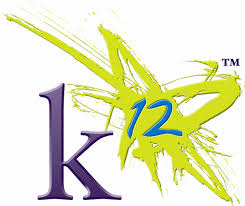Isn't is amazing what one conversation with a good friend can do? I hung up the phone with a whole new vision of what home school + K12 could be. It was almost like I needed permission to think outside the box--just like I was the one in school. Maybe if I didn't do things their way, I would get a pink slip or something. I realized that they are giving me scholastic guidelines.
The next day, school looked a lot different. For one thing,
I gave the children my password. I NEVER give the children my password, but, in this case, I decided it was an essential coping skill. I communicate with my children, we have a very small house so I know what they are doing (well, unless it involves a Sharpie), and I trust them. They aren't to go into my account, but if they are supposed to have me type in my password to give them permission to take a lesson assessment, just tell me what is going on then
type in digits. (The password is just was it says: momsaid.) I can't be hoping up and down and all over the house to perform this menial task.
The second change was that
I re-instituted Structure Time, Not Content, kind of. Content is way more structured than at any other time, but they have the autonomy to choose what to do and when. I printed off their assignments for the week and put them in daily labeled folders. Tuesday may have a literature assignment and Wednesday may have a science assignment, but if they feel like doing science on Tuesday, go for it! They know what is expected for the week, given some parental reminders, they can accomplish those expectations in whatever way fits their style.
One of the big problems I found with K12 was that each grade is learning different things. Now, I'm not talking about the first grader was learning addition, so we're all learning addition. I'm talking about . . . well, for instance, the fourth grader was doing a unit on ecosystems and did a fun experiment. Before, I would have had a family unit on the ecosystem and adapted it for the different learning levels. K12 wants be to do a unit on ecosystem with one child, minerals with another and measurements with another. This is the third thing I changed for the next day.
We did more learning as a family. One child was learning about how to use a scale so the younger four all gathered around the table as we learned about weight. It was a fun unit, so we all did it. I didn't shoo anyone away because, "this isn't your lesson." Who cares? If it is interesting and we want to learn it, we are going to learn it. This will make some lessons hurried or taught with less care, but others will be rich and exciting. It is a good exchange.
Fourth,
I let myself let the children skip lessons if they don't apply. Why review the
short a sound when a child is reading Level 1 books? Skip it. Go right to lessons at their level.
Finally,
I kept doing what I knew was working. When my first grader's assignment was a boring worksheet intended to teach her to count by two's, I threw it out. When a six-year-old, one week into school, proclaims that she hates school, that is not good. Instead, we jumped rope and counted by two's, we counted sit-ups, we counted books, we drew on the sidewalk. She still knew how to count by two's at the end of the lesson, but I didn't hear, "I
hate this!" anymore.
And that's where we are. Slowly, slowly, we are finding our groove within the K12 frame-work. How is school going for you?
Read more...









